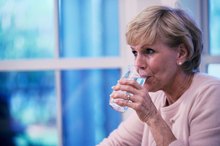Diet for Diarrhea With Bloating
Diarrhea is a condition in which you experience loose, watery stools, often accompanied with cramps and bloating. The acute, or short-term, form of diarrhea generally is caused by food, bacteria or a virus and lasts only a couple of days. Chronic diarrhea is usually associated with a chronic illness such as irritable bowel syndrome. Bloating is generally caused by trapped air in the abdomen and bowels, produced as a byproduct of the life cycle of a parasite, bacteria or virus. Some individuals experience diarrhea and bloating due to food intolerance or the natural reaction to substances in food such as beans. Making dietary changes can often help relieve this type of diarrhea and bloating.
If you are experiencing serious medical symptoms, seek emergency treatment immediately.
Drink clear liquids and electrolyte replacement beverages throughout the day. Diarrhea leads to a substantial loss of water, which needs to be replenished to prevent dehydration 1. The majority of your fluid intake should be water, followed by clear broths and juices, except pear, apple and grape juice -- which can all cause additional stomach upset.
How to Stop Diarrhea on a High-Protein Diet
Learn More
Don't eat foods that are high in dietary fiber. A diet that is high in fiber is usually healthy, but if your stomach is upset, fiber can make diarrhea and bloating worse. Instead, emphasize foods like plain white rice, boiled potatoes and plain toast. Once your symptoms subside, you can gradually add foods that contain fiber into your diet.
Eat small portions of baked or broiled low-fat proteins, such as skinless white meat chicken, lean red meat, pork or fish. According to MedlinePlus, you can also try eating low-fat dairy products and cooked eggs 1. However, for some people, dairy products can make diarrhea and bloating worse 1. If you are lactose intolerant, avoid eating dairy products until your symptoms subside, then gradually reintroduce them as tolerated.
What Causes Abdominal Bloating After Eating?
Learn More
Avoid eating highly processed, fatty foods like hamburgers, doughnuts or french fries, because these kinds foods can make your already upset digestive system feel even worse. Additionally, avoid foods that contain large amounts of spices or spicy condiments.
Stay away from foods that contain artificial sweeteners ending in the suffix "-ose." According to the National Digestive Disorders Information Clearinghouse, some people are unable to digest artificial sugars such as maltose and lactose. Some products, labeled "sugar-free" contain these sweeteners, and consuming large amounts can cause diarrhea and bloating, even if you don't have a digestive problem.
Tips
If your diarrhea lasts for more than two days, or is accompanied by nausea or vomiting, pain or a high fever, call your doctor. These can be symptoms of an underlying illness or infection that requires medical intervention.
Related Articles
References
- Medline Plus: When You or Your Child Has Diarrhea
- Appendix 7. Nutritional Goals for Age-Sex Groups Based on Dietary Reference Intakes and Dietary Guidelines Recommendations - 2015-2020 Dietary Guidelines - health.gov. Health.gov. https://health.gov/dietaryguidelines/2015/guidelines/appendix-7/. Published 2015.
- Hatchette TF, Farina D. Infectious diarrhea: when to test and when to treat. CMAJ. 2011;183(3):339-44. doi:10.1503/cmaj.091495
- Robert Steffen, Klaus Gyr, Diet in the Treatment of Diarrhea: From Tradition to Evidence, Clinical Infectious Diseases, Volume 39, Issue 4, 15 August 2004, Pages 472–473, doi:10.1086/422328
- Mäkinen KK. Gastrointestinal Disturbances Associated with the Consumption of Sugar Alcohols with Special Consideration of Xylitol: Scientific Review and Instructions for Dentists and Other Health-Care Professionals. Int J Dent. 2016;2016:5967907. doi:10.1155/2016/5967907
- Zodpey S, Deshpande S, Ughade S, Hinge A, Shrikhande S. Risk factors for development of dehydration in children aged under five who have acute watery diarrhoea. Public Health. 1998;112(4):233-236. doi:10.1016/s0033-3506(98)00238-8
- Gould M, Sellin JH. Diabetic diarrhea. Curr Gastroenterol Rep. 2009;11(5):354-9.
- Nyachuba DG. Foodborne illness: is it on the rise? Nutr Rev. 2010;68(5):257-69. doi:10.1111/j.1753-4887.2010.00286.x
- Appendix 7. Nutritional Goals for Age-Sex Groups Based on Dietary Reference Intakes and Dietary Guidelines Recommendations - 2015-2020 Dietary Guidelines - health.gov. Health.gov. Published 2015.
- Barr W, Smith A. Acute Diarrhea in Adults. American Family Physician. 2014;89(3):180-189.
- Hartman S, Brown E, Loomis E, Holly Ann Russell. Gastroenteritis in Children. American Family Physician. 2019;99(3):159-165.
- Murao S, Hosokawa H. Serotonin 5-HT3 Receptor Antagonist for Treatment of Severe Diabetic Diarrhea. Diabetes Care. 2010;33(3):e38-e38. doi:10.2337/dc09-2131
- National Institute of Diabetes and Digestive and Kidney Diseases. Eating, Diet, & Nutrition for Diarrhea. Published July 2019.
- Steffen R, Gyr K. Diet in the Treatment of Diarrhea: From Tradition to Evidence. Clinical Infectious Diseases. 2004;39(4):472-473. doi:10.1086/422328
Writer Bio
Maura Banar has been a professional writer since 2001 and is a psychotherapist. Her work has appeared in "Imagination, Cognition and Personality" and "Dreaming: The Journal of the International Association for the Study of Dreams." Banar received her Bachelor of Arts in psychology from Buffalo State College and her Master of Arts in mental health counseling from Medaille College.









